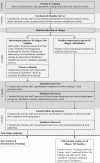Protocol for a cluster randomised controlled trial evaluating a parenting with home visitation programme to prevent physical and emotional abuse of children in Indonesia: the Families First Programme
- PMID: 30782674
- PMCID: PMC6340427
- DOI: 10.1136/bmjopen-2018-021751
Protocol for a cluster randomised controlled trial evaluating a parenting with home visitation programme to prevent physical and emotional abuse of children in Indonesia: the Families First Programme
Abstract
Introduction: Every year, up to 1 billion children are victims of violence worldwide. Most child abuse takes place in the context of punishment. The Families First Programme, an adaptation of the Positive Discipline in Everyday Parenting Programme to the West Java context, is a parenting support programme anchored on children's rights that gives parents guidance on child development, parenting and positive discipline practices. This trial will evaluate the effectiveness of the Families First Programme compared with a waitlist control group.
Methods and analysis: This is a pragmatic, parallel-group, stratified, cluster-randomised controlled trial. Twenty rural and urban villages in the Cianjur District, Indonesia, involving 720 caregivers of children up to 7 years of age, will be randomised. Villages will receive either a parenting programme consisting of 10 group sessions and four home visits over 3 months and standard community health and social services or just the latter. After completion of the trial period, the programme will be offered to those in the delayed group. Outcome data will be collected before randomisation (baseline), immediately postintervention (3 months postrandomisation) and 6 months later (9 months postrandomisation). The primary outcome will be frequency of physical and emotional punishment as measured by a weighted sum from three self-report items. Primary outcome analysis will use Poisson regression with generalised estimating equations and assess the interaction between intervention and time over baseline and 3 and 9 months postrandomisation assessments. Concurrent process evaluation will be conducted to assess programme satisfaction and facilitators and barriers to the implementation of the programme generalisable to other settings.
Ethics and dissemination: Ethics approval was obtained from McGill University and Universitas Katolik Indonesia Atma Jaya. Results will be published in peer-reviewed journals and presented at scientific conferences and events for decision-makers, including in the participating communities.
Trial registration number: NCT03374761.
Keywords: child protection; epidemiology; public health; qualitative research.
© Author(s) (or their employer(s)) 2019. Re-use permitted under CC BY-NC. No commercial re-use. See rights and permissions. Published by BMJ.
Conflict of interest statement
Competing interests: All coauthors report grants from Children and Violence Evaluation Challenge Fund–Network of European Foundations and from Save the Children Fund, during the conduct of the study. RWP reports personal fees from AbbVie, Amgen, Eli Lilly, Pfizer and Searchlight Pharma, outside the submitted work.
Figures
References
-
- WHO, Child Maltreatment. Fact Sheet. Geneva, Switzerland: World Health Organization, 2016.
-
- Kerjasama et al. Ringkasan hasil. Survei sekerasan terhadap anak indonesia tahun 2013 [Summary of Findings. Suvey of Violence Against Children Indonesia 2013]. 2013. Kerjasama, Kementerian sosial, Kementerian pemberdayaan perempuan dan perlindungan anak, Badan perencanaan pembangunan nasional, Badan pusat statistik, and UNICEF Indonesia: Jakarta, Indonesia.
Publication types
MeSH terms
Associated data
LinkOut - more resources
Full Text Sources
Medical


